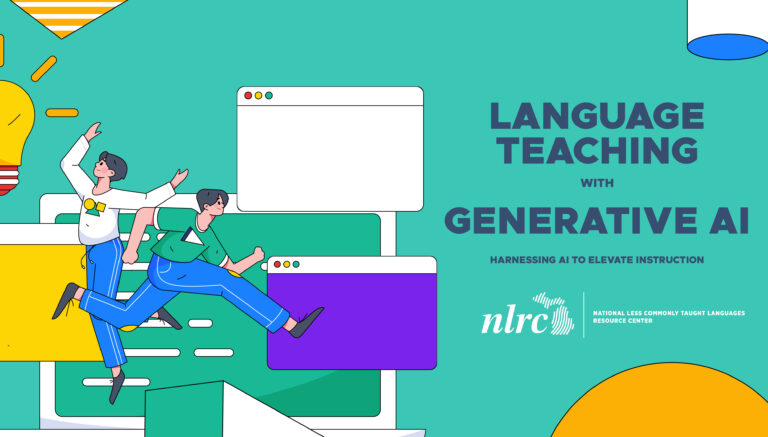Announcing the 2025 MAFLT LCTL Innovation Award Winners!

The NLRC is excited to announce the 2025 MAFLT LCTL Innovation Award winners!
The NLRC gives these awards to recognize outstanding innovations in LCTL instruction. These innovations use technology to creatively and effectively address a real, context-based problem in LCTL education. Award winners use technology to transform traditional teaching practices, prompting learners to explore, create, and develop proficiency with language through accessible technology. These awards are generously sponsored by the Masters in Foreign Language Teaching at Michigan State University.
For the 2025 edition, the two winners are Juliano Saccomani from University of Chicago (Classroom Activities category) and the team composed by Shannon Quinn from Michigan State University and Anna Tumarkin from University of Wisconsin-Madison (Learning Materials category)! Each winner will be awarded a cash prize of $500.
Dr. Saccomani’s virtual reality project is a great example of a pedagogical innovation that is completely integrated in the existing curriculum. Rather than a one-off technology-supported activity, the immersive experience is scaffolded into a well-planned learning progression and promoted independent learning and cultural understanding.
Dr. Quinn’s and Dr. Tumarkin’s Open Educational Resource, Diverse Russian: A Multicultural Exploration, is an entire textbook devoted to exploring Russian-speaking communities outside of Russia. The OER embraces a degree of translingual pedagogy by including speakers of Russian with regional variations as well as including information about and samples of local languages. The technology of the OER is also innovative, incorporating a large variety of interactive features, including interactive video, interactive slideshows, gamification, and collaborative activities that allow students to connect to other learners of Russian. The technology, which provides scaffolding for students when it is needed but can remain unobtrusive when it is not needed, allows the materials to be used by a larger number of students, giving instructors the power to differentiate.
Given the high quality of their submissions, we also choose two projects to receive honorable mention: the team composed by Lini Polin of University of North Carolina Chapel Hill and Bonnie Wang of Durham Academy (Classroom Activities category), and Adeola Agoke from University of Wisconsin-Madison (Learning Materials category).
Dr. Polin and Ms. Wang collaborated on a multi-year curriculum design and implementation on teaching social justice topics to Chinese as a heritage language (CHL) learners in both the high school and the university. the two instructors facilitated service-learning and project-based learning throughout the thematic unit covering topics on Asian American immigration history, stereotypes about Asians, anti-Asian hate crimes, and anti-discrimination strategies. The innovation facilitated sustainable collaboration between the two institutions, motivated students’ learning, and fostered students’ critical thinking skills.
Dr. Adeola Agoke’s project is a Proficiency-based Yoruba Dictionary. Existing dictionaries in Yoruba are excellent learning reference resources. However, they are not designed to meet the language needs of foreign learners, as evidenced in the zero attention to the proficiency levels of dictionary users. Additionally, tone is critical to Yoruba language learning and use, but existing dictionaries do not provide users with the tools to hear the pronunciation of the vocabulary words. This dictionary project aims to redesign the structure of the Yoruba dictionary based on learners’ proficiency level. Also, the proficiency-driven dictionary is contextualized with audiovisuals and supported with tools for pronouncing Yoruba tonal words.
Congratulations to all the MAFLT LCTL Innovation Award winners and honorable mentions. Keep an eye out for next year’s award call on the NLRC newsletter and social media!


